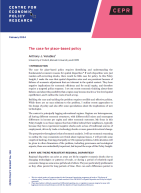Why do regional disparities persist? The Policy Insight identifies several factors contributing to the emergence and endurance of regional disparities. These include negative economic shocks triggered by technological advancements or shifts in trade patterns, together with the uneven impact of rapid economic transformations on different regions. These disparities often persist over many decades because of failure of two key economic adjustment mechanisms. Migration – moving labour out of lagging regions – is selective, easier for the young and the skilled, and damaging for those left behind. Movement of jobs into lagging regions is also slow and selective. The location of many firms is ‘sticky’, as businesses are reluctant to leave existing centres of activity where they benefit from an ecosystem of labour skills, suppliers, and customers. This is particularly so for high-skill and knowledge intensive activities. The outcome for lagging regions is a ‘low-level spatial equilibrium’, from which it is hard to escape.
Addressing spatial inequalities – the role of policy: the failure of automatic adjustment mechanisms to rectify spatial disparities dictates the need for targeted policy interventions. Transformative policies aimed at shifting regions out of a low-level spatial equilibrium must stimulate significant private investment and address coordination failures. The author proposes a comprehensive framework for designing and implementing place-based policies, which emphasises the importance of clear objectives, multiple policy instruments, and local involvement in addressing regional disparities. It also highlights the need to anticipate and mitigate indirect effects, such as displacement and skills improvement, to ensure the success of transformative policies.
The impact of new technologies on regional disparities: While acknowledging the speculative nature of the impact of new technologies on regional disparities, the author suggests that ongoing advancements, such as digitisation and remote work practices, may reinforce the value of cities. However, these developments may not significantly benefit lagging regions unless they offer unique amenities to attract residents.
Overall, the Policy Insight provides valuable insights and recommendations for tackling one of the most pressing challenges facing modern economies. By stimulating private investment and implementing comprehensive policy packages, policymakers can achieve transformative change in lagging regions, fostering economic growth and social equity.





